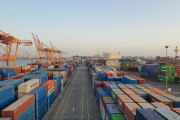In the realm of international trade and e-commerce, the concept of cross-border e-commerce has emerged as a pivotal strategy for businesses looking to expand their market reach beyond domestic borders. One of the critical factors influencing the success of cross-border e-commerce is efficient logistics and warehousing solutions.
Among the various options available to streamline logistics, US overseas warehousing has proven to be a game-changer. But how exactly does US overseas warehousing support cross-border e-commerce?

Firstly, US overseas warehousing facilities act as strategic hubs that facilitate faster and more cost-effective shipping to international markets. By positioning inventory closer to the end customers, these warehouses reduce transit times and shipping costs, which are crucial considerations in the competitive world of e-commerce.
Secondly, these warehouses enable businesses to manage their inventory more effectively. With real-time inventory management systems and advanced logistics capabilities, companies can optimize stock levels and ensure they meet demand fluctuations without the risk of overstocking or understocking.
Thirdly, US overseas warehousing helps mitigate risks associated with international shipping. By storing goods in local warehouses, businesses can navigate complex customs procedures and regulatory requirements more efficiently. This reduces delays and minimizes the likelihood of unexpected costs or complications during the shipping process.
Moreover, US overseas warehousing supports cross-border e-commerce by enhancing customer satisfaction. Faster delivery times and reliable shipping options contribute significantly to a positive customer experience, which is crucial for building brand loyalty and encouraging repeat purchases.

Lastly, these warehousing solutions contribute to sustainability efforts by optimizing shipping routes and reducing the carbon footprint associated with long-distance transportation. This aligns with global trends towards environmentally friendly business practices.
In conclusion, US overseas warehousing plays a vital role in supporting cross-border e-commerce by improving shipping efficiency, reducing costs, managing inventory effectively, mitigating risks, enhancing customer satisfaction, and promoting sustainability. As businesses continue to expand globally, investing in robust logistics solutions such as US overseas warehousing will be increasingly essential to staying competitive in the international marketplace.